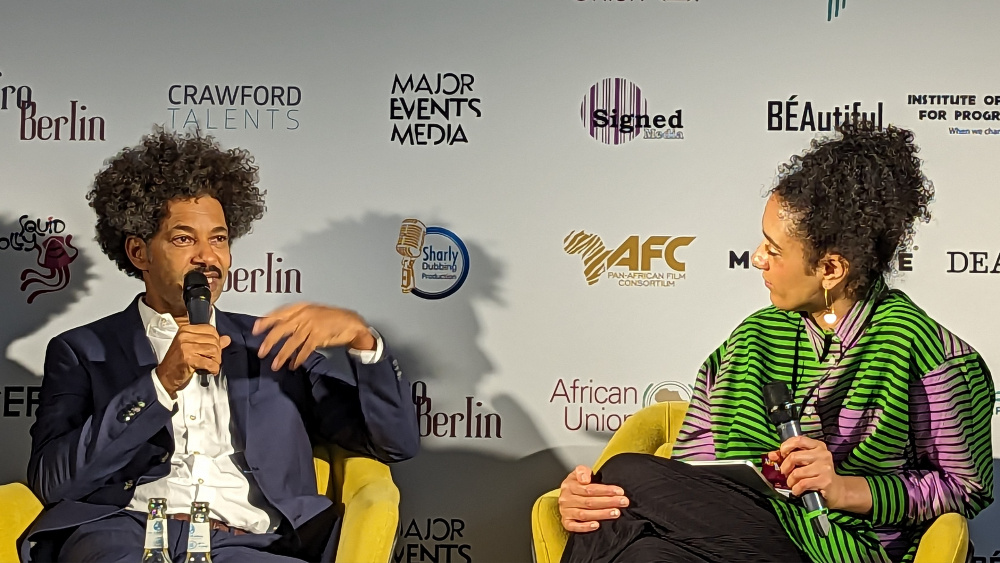African Filmmakers Mark Gains in Berlin, Say ‘There’s Room for More’
Africa’s growing screen industries are making their mark on the global stage, with three titles in the main competition at this year’s Berlin Film Festival, but how to unlock the continent’s still-untapped potential was a question on the minds of many at a conference hosted on Saturday by the European Film Market.
A partnership between EFM and Prudence Kolong’s Stockholm-based consulting firm Yanibes, AfroBerlin was launched to give a platform to filmmakers from Africa and the diaspora and “to find a place where they can share stories and experiences and be heard,” said Kolong, who also organizes the Cannes Film Festival’s AfroCannes industry showcase.
The event brought together industry professionals from the continent with their counterparts in Europe and beyond, underscoring the ways in which the often-marginalized African screen industries have elevated their international profile. “When we’re talking about the global film market…we are part of the discussion,” Kolong said. “People are thirsty to know more about African stories.”
This year marks an auspicious Berlinale for filmmakers from the continent, with veteran Mauritanian-Malian auteur Abderrahmane Sissako’s “Black Tea” and French-Senegalese director Mati Diop’s “Dahomey” both bowing in the main competition, alongside Nelson Carlos De Los Santos Arias’s “Pepe,” a co-production between the Dominican Republic, Namibia and Germany. The jury, meanwhile, is headed by actor Lupita Nyong’o, who was raised in Kenya and whose ascent to A-list status in Hollywood is a source of pride and inspiration for many up-and-coming African talents.
The day’s sessions — wide-ranging, spirited, at times fractious — highlighted both the dynamism of film and TV production in Africa and its diaspora, as well as the challenges filmmakers face at a time when global crises and shifting economic headwinds have rattled screen industries worldwide.

Mati Diop’s “Dahomey” is competing for the Golden Bear in Berlin.
Courtesy of Berlin Film Festival
“Financing is a problem. Because we don’t have the infrastructure as such on the continent. We don’t have the funding bodies you have in Europe and the Americas,” said Jacqueline Nsiah, a member of the selection committee for the festival’s competitive Encounters strand, who appeared in conversation with Berlinale executive director Mariëtte Rissenbeck and Neom’s managing director of media industries, entertainment and culture, Wayne Borg.
“The biggest challenge is to find a way to create networks to create funding opportunities on the continent,” she continued. “Producers are trying to find ways to tap into private investors, private companies. And I think that needs to happen more.”
In recent years, the panacea for many African creators has been an uptick in commissioning spend from global streaming platforms, though that optimism has dimmed in light of Amazon’s decision last month to press pause on its original content production on the continent, and broader questions about whether streaming giants are fully committed to Africa.
Borg, however, stressed that “there’s a lot of movement the other way” into the region, adding that his growing Saudi Arabian production powerhouse is “keen to engage more with the African industry.”
“For us, the African market, the Indian market, are equally important to us. What we’re keen to do is to create the right recipe, the right ingredients, to do that,” he said. “We’re open for business.”
Crossing borders
Africa’s diaspora community was out in full force on Saturday, reflecting on the multiplicity of cultures and backgrounds that shaped them; the term “Afropean” — a mélange of African and European identities — was adopted by several of the speakers, while others represented the wider diaspora in Latin America, the Caribbean and the U.S.
“To be an African is not to belong to a so-called country,” said Welket Bungué, a multi-hyphenate of Bissau-Guinean and Portuguese descent who’s based in Berlin. “We can be simultaneous. We don’t have to be one thing or another.”

Abderrahmane Sissako is competing at this year’s Berlinale with “Black Tea.”
“Black Tea” (© Olivier Marceny, Cinefrance Studios, Archipel 35, Dune Vision)
For many young Africans — whether the children of immigrant parents in Europe and the U.S. or the consumers of global content on African soil — the old borders no longer apply. The growth of the continent’s screen industries is likely to reflect that trend: While Neom’s Borg made a strong pitch for the Saudi biz — which, with financing tools such as the Red Sea Film Fund, is fast becoming a key player in the African market — Saturday’s conference also made the case that there’s room for more trans-Atlantic collaboration between countries in the global South.
Luiz Toledo of Brazil’s Spcine, the city of São Paulo’s film and TV body, which signed a co-production agreement with South Africa’s National Film and Video Foundation last year, underscored that Brazil is home to the second-largest Black population on the planet — making it ripe for co-productions and other collaborations with African partners.
Throughout the day, speakers highlighted the need for African creators to seize control of their own narratives. “In order to tell our story properly, three-dimensional, with an impact…we need to be in power positions at every step of the process,” said Tyron Ricketts, one of Germany’s most successful Black actors, who produced the series “Sam — a Saxon” for Disney Plus through his Panthertainment label.
What that looks like, the world is only beginning to find out. Africa is yet to produce a paradigm-shifting movie or series on the level of South Korea’s “Squid Game,” but Editi Effiong’s revenge thriller “The Black Book” became the first-ever Nigerian film last year to reach #3 on Netflix’s worldwide film charts, breaking the streamer’s Top 10 list in more than 69 countries.
“There’s nothing to say that content from the African continent, from the Middle East, shouldn’t find a global audience. Great stories will travel,” said Neom’s Borg. Despite the strong African representation at this year’s Berlinale, Nsiah insisted: “There’s always room for more.”

